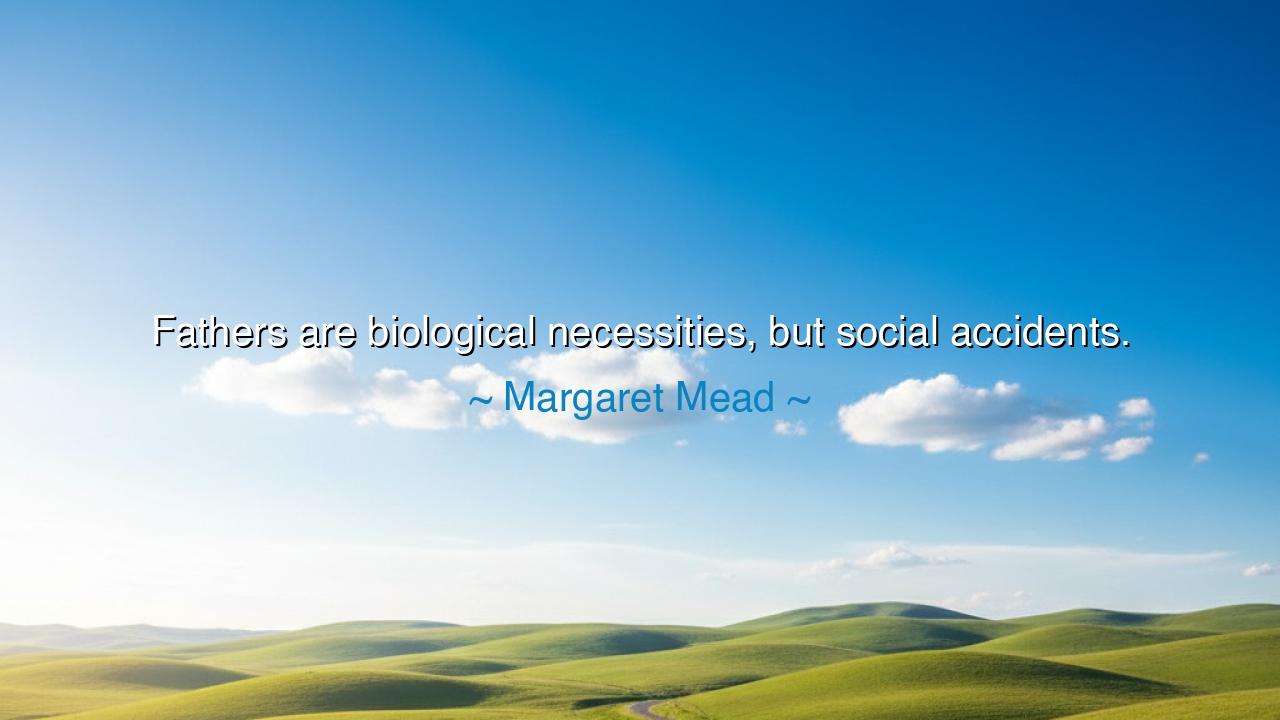
Fathers are biological necessities, but social accidents.






The words of Margaret Mead, “Fathers are biological necessities, but social accidents,” echo like a challenge hurled across the centuries—a cry that questions what it truly means to be a father, not merely by blood, but by spirit. In this paradox, Mead captures both the natural and the moral dimensions of fatherhood. She reminds us that nature alone can produce a man’s offspring, but it takes character, will, and love to make him a father in truth. Biology may create the bond, but only the heart sustains it. The phrase is both revelation and rebuke—a call to recognize that while the act of creating life is common, the art of nurturing life is sacred and rare.
Margaret Mead, the great anthropologist of the twentieth century, was a student of humanity in all its forms. She journeyed through the islands of the Pacific and the tribes of New Guinea, seeking to understand the ways societies shaped love, gender, and kinship. It was in these studies that she saw the diversity of human family structures—some centered around fathers, others not at all. In some cultures, the father’s role was vital and constant; in others, it was distant or undefined. From these observations arose her insight: the father’s biological role is universal, but his social role—his participation in love, care, and upbringing—is shaped by culture, choice, and circumstance. Thus, she called fathers “social accidents,” not to demean them, but to remind us that their significance depends not on nature alone, but on the choices of men and societies alike.
Yet there is an ache within her words, an unspoken plea for men to rise above the accident—to become fathers not by chance, but by calling. The biological necessity of the father ensures that life continues, but the social necessity of the father ensures that life thrives. It is easy to create; it is harder to care. It is simple to sow the seed; it is divine to nurture the harvest. Many men, through fear, neglect, or ignorance, have failed this sacred duty—leaving children to grow without the steady hand or wise voice that might have guided them. Mead’s words remind us that civilization depends not merely on birth, but on presence—on the shaping power of men who choose to stand, protect, and love.
Consider the story of George Washington, known not only as the Father of his Country but as a man who embodied this deeper sense of fatherhood. He had no children of his own, yet his care extended to an entire nation. He guided, taught, corrected, and sacrificed as a father does. His strength was not biological, but moral. He proved that fatherhood is not bound by blood—it is an act of stewardship, of responsibility, of love offered freely to those who need it. Through him, we see that the title of “father” must be earned through action, not inherited by nature.
In contrast, history offers countless examples of those who fulfilled their biological roles but failed in their human ones—kings who sired heirs only to abandon them, conquerors who built empires but shattered their own households, men who feared powerlessness and so turned their love into control. These are the “social accidents” of which Mead spoke: fathers by birth, but strangers in the souls of their children. They remind us that it is not lineage that sustains a family, but compassion; not authority that nurtures, but attention; not presence of name, but presence of heart.
And yet, there is hope in her statement, for if fatherhood is not fixed by nature, then it may be redeemed by choice. Every man, no matter his past or his pain, may decide to become a true father—to be the steady voice, the safe harbor, the living example of patience and courage. Fatherhood is an art that begins anew with each act of love. To teach a child truthfully, to protect them fiercely, to believe in them when the world does not—these are the sacred duties that elevate biology into blessing. Mead’s words call every man to this transformation, to turn the accident of his existence into the intention of his care.
So, dear listener, let this be the lesson passed from one generation to the next: fatherhood is not given—it is chosen. To be a father is not to fulfill a law of nature, but to fulfill a law of love. The man who brings a child into the world holds in his hands not a possession, but a promise. Let him not vanish into silence, nor hide behind tradition, but rise to the calling of his soul. Let him be teacher, protector, companion, and guide. For though any man may be necessary to life’s beginning, only the true father ensures its flourishing.
In this way, the wisdom of Margaret Mead becomes not an accusation, but an invitation—to men everywhere to transform what nature begins into what spirit perfects. The world has enough fathers by accident; it hungers for fathers by devotion. And when such men rise, they turn what was once an accident of biology into a triumph of humanity—proving that love, not lineage, is the greatest inheritance of all.






AAdministratorAdministrator
Welcome, honored guests. Please leave a comment, we will respond soon